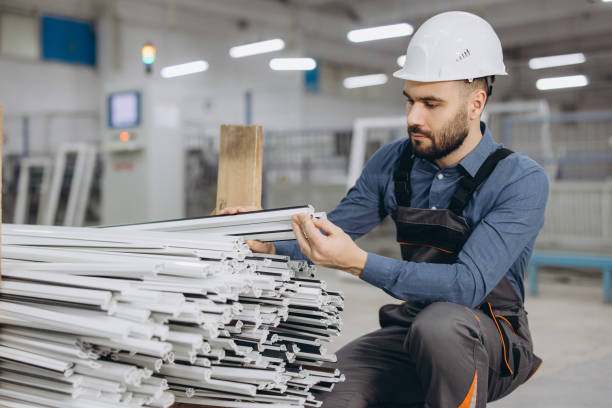When to Invest in Aluminum Framing for Scalable and Reconfigurable Structures
Every business evolves, and with that growth comes the challenge of keeping workspaces efficient and adaptable. Traditional materials often fall short when it comes to flexibility, making it harder to scale or reconfigure structures without excessive costs and downtime. That’s where aluminum framing steps in, offering a solution that is durable, lightweight, and endlessly customizable.
Your Business Needs a Workspace That Grows Without Major Renovations
Workspaces should be as dynamic as the industries they serve. Whether it’s a manufacturing plant, a research facility, or a tech lab, business needs rarely stay the same. Rigid structures make it difficult to adapt, leading to expensive renovations and wasted space. Aluminum framing offers a practical alternative by allowing businesses to reconfigure layouts without tearing down walls or investing in new permanent structures.
The ability to expand, shift, or restructure workspaces quickly gives businesses a competitive edge. Instead of dealing with costly construction projects, companies using aluminum framing can modify their setups on demand. This level of adaptability is especially beneficial for startups and growing companies that need a scalable solution without the hassle of traditional remodeling.
Frequent Equipment Upgrades Require a Flexible Support System
Industries relying on ever-changing technology can’t afford to have infrastructure that lags behind. When new machinery or equipment is introduced, the surrounding framework needs to support it seamlessly. Traditional materials, such as steel or wood, often require extensive modifications to accommodate these upgrades, leading to downtime and additional labor costs. Aluminum framing eliminates these obstacles by providing a flexible system that can be adjusted or expanded as needed.
The modular nature of aluminum structures allows companies to integrate new tools and systems without having to dismantle existing setups. Whether it’s adding conveyor systems, robotics, or specialized workstations, businesses can make adjustments without disrupting daily operations. This flexibility ensures that production remains efficient and aligned with the latest advancements in technology.
Traditional Steel Frames Limit Expansion and Customization
Steel has long been a go-to material for industrial and commercial structures, but its rigidity can become a major limitation. Once welded or bolted into place, steel frames are difficult to modify without significant effort. If a workspace needs to expand or adjust to new processes, businesses using steel often find themselves locked into costly rebuilds. Aluminum framing removes these constraints by offering a lightweight, customizable alternative.
Unlike steel, aluminum structures can be assembled, disassembled, and reconfigured with minimal effort. This makes them ideal for businesses that anticipate future growth or operational changes. Whether it’s adjusting workstation layouts, expanding production areas, or introducing new storage solutions, aluminum framing makes customization straightforward and cost-effective.
Lightweight Yet High-Strength Structures Are Essential for Efficiency
Heavy materials can slow down operations, especially in environments where efficiency is key. Steel, while strong, adds significant weight to structures, requiring reinforced foundations and additional support. Aluminum framing provides the same strength benefits as steel while remaining significantly lighter, reducing the burden on flooring, support systems, and transportation.
The reduced weight of aluminum structures makes them easier to handle during assembly and relocation. Employees can move and reconfigure components without needing heavy machinery, cutting down on installation time and labor costs. This makes aluminum an excellent choice for industries where mobility and efficiency are critical factors.
Quick Assembly and Disassembly Become a Priority for Operations
Businesses working under tight schedules can’t afford lengthy installation times. Traditional framing systems often require extensive labor, welding, and specialized tools, making setup and modifications time-consuming. Aluminum framing, however, is designed for quick and easy assembly, allowing businesses to deploy new structures with minimal downtime.
Modular aluminum components come with pre-engineered connections that allow for tool-free adjustments and rapid installation. Whether it’s setting up a new production line, rearranging office layouts, or expanding a warehouse, aluminum framing speeds up the process significantly. The ability to disassemble and relocate structures without damaging components further enhances its appeal for businesses needing agility in their operations.
Industry Regulations Demand Adaptable and Modular Designs
Compliance with industry regulations can be a moving target. Safety standards, workspace efficiency, and environmental guidelines often change, requiring businesses to adjust their setups accordingly. Traditional fixed-frame structures make it challenging to meet new requirements without costly overhauls. Aluminum framing, with its modular design, allows companies to stay compliant without extensive reconstruction.
In industries where hygiene and safety are paramount, such as healthcare, food processing, and cleanrooms, aluminum’s non-corrosive and easy-to-clean properties provide an added advantage. Businesses can modify layouts, add safety barriers, or create enclosed spaces while maintaining compliance with evolving industry standards. The flexibility of aluminum framing ensures that businesses can adapt without unnecessary disruptions or expenses.




